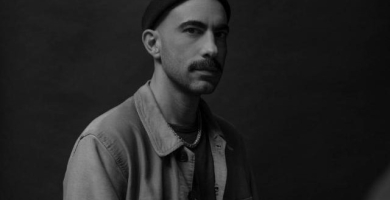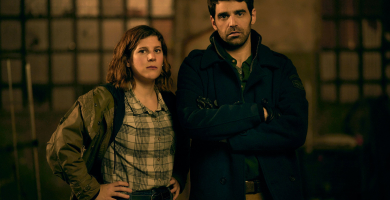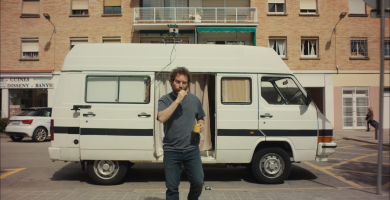
FERNANDO FRÍAS: “For me one of the greatest virtues of the project is having been in Barcelona and having explored it.”
This month we interviewed the Mexican film director Fernando Frías. His latest film I Don’t Expect Anyone to Believe Me was shot to a large extent in Barcelona. We talked to him about this project which visited our city and can already be seen on Netflix.

How did your interest in film begin and when did you decide that you wanted to be a director?
From a very young age, because my father’s a film buff and we watched films at home almost every day. I think that inspired my interest in film, although the interest in making films was different. I grew up in the 80s and 90s, the years of those huge blockbusters and action films. And it was more when I saw films with which I identified a lot and I thought “Ah, right. You can also put someone’s life”. I sort of thought “I want my life to be like in the films I watch. And if not, I at least want my films to be like the life that I’m living”. I suppose that in early adolescence I began to identify with some films and this inspired me.
This is your third fiction project. How did the idea arise of adapting the book by Juan Pablo Villalobos to film? What attracted you to it?
There were several circumstances. The truth is that life doesn’t stop giving surprises. My second feature film, I’m No Longer Here, was going through a really bad time. A pause in the middle of filming. This film has a component in Mexico and another in New York. We’d already filmed in Mexico and we had to wait a year for financial reasons and because they refused to grant the actor’s visa. What happened is that, at one of those moments when I was really tense, I came across this novel and began to read it. It’s not that I read it and then it occurred to me to adapt it. Rather, while I was reading it, I could see it and I found the characters very interesting. I thought that maybe I’m No Longer Here was going to be complicated for the audience, because I was having problems funding it. In the end the funding depends, as far as I could see in what I suppose is a very naive way, on people with decision-making power who know what the audience wants and who fund things thinking of what they’re going to like. I don’t like to boast, but I’m No Longer Here ended up representing a milestone. An unexpected success. And then I thought “what am I going to do if I can’t finish the film? And I’ve already filmed half of it. Am I going to cross the border illegally with this lad to film in New York? Where am I going to get the money from?” Reading the novel I thought “this sounds like something funnier, more direct and light”. But the way things work out, it ended up being maybe a less convivial film for the general public than the other one and it requires a lot more from the viewer, in terms of intellectual pace and the quantity of things that are captured on the canvas represented by the film.
Is it difficult to adapt a book to film, with them being two different media, and what was the experience like? Did the writer Juan Pablo Villalobos take part?
He absolutely took part a lot, a great deal. Indeed, the difficult thing was choosing which parts to leave out. Because the more you want to leave things in, the more you need a structure that supports this, that connects it. And there are certain details which I find fantastic in the novel and which don’t necessarily have to be in the film. And he was really in favour of us taking things out and leaving them and that’s what we did. In the end it’s more the translation than the sensation of the story, of the elements that make it up which are very different. The novel has a lot of fans. Normally people can’t avoid comparing one form with the other, but they become two completely different things.
Does premiering on a platform determine the shooting of a film in some way?
Thanks to the success that we had with the previous film they invited me to do another project and I chose this. Also, on considering that it was a project that was going to be created and to be on the platform, I wanted to do something that, although it’s going to live in that world, would suggest a little more, and try to appeal to a viewer who is a little more active and maybe not so passive. I was concerned about swelling the ranks of that maybe empty, didactic, immediate, entertaining, forgettable content and appealing to the passive side which I feel is what stands out as regards numbers on the platforms. In other words, the algorithm.
The strategy to launch a film funded by a platform must be very different. What role do film festivals also play in this strategy?
The truth is that’s a good question that I still ask myself. You can’t say that you depend on the festivals because on coming from this platform the doors to many are closed for you to a large extent, especially during the time of the strike. Also, the strategy continues to be a mystery for me. I’m extremely disappointed because there was absolutely no promotion. So I don’t understand why the film is made, if it’s then launched on a Wednesday without any prior notice. Let’s say that I had an incredible relationship with the platform with the other film. Apart from the fact that the other film began to work and then they began to promote it. And it was something very different with this one. I also think it’s related to the fact that it was handled by a different team within Netflix, but I don’t understand the strategy and the truth is that it was very sad in that respect.
You shot a large part of the film here in Barcelona. What does the city bring to the film?
It’s another character. For me one of the greatest virtues of the project is having been in Barcelona and having explored it. We wrote 100% of the last version of the script being there. It was very interesting for me to attempt to replace some things from the novel. To take what was the Plaza del Sol and try to make the Plaza del Raspall. And to immerse ourselves in the diversity that exists and in the balm of such a welcoming city for people from so many different worlds. That, although its Europe, it isn’t in such drastic conditions, as regards either the climate or the economy or the ideological rigidity. It’s quite cosmopolitan and at the same time it’s small.
Did you encounter many differences between shooting in Mexico and in Barcelona?
Yes, very many. In Barcelona I really liked the way in which the crew works, which is very professional and completely committed. There are things that I didn’t understand like the famous “sandwich break”. I said “but, why? If we ate just 10 minutes ago!” And they said to me “yes, but it has to be now”. And I said: “alright. Ok, sandwich break” (laughs). The crew is wonderful, as long as they don’t have to do one minute more or one minute less, they behave brilliantly. To me that was one of the best experiences. A very hard-working, very professional crew, which I haven’t often seen.
You mentioned that you were writing the last part of the script here. What was the location process like in the city? Were you walking around the city to see the places and locate?
Yes, exactly. Not just in the city; we also went to the coast, further north. I often went alone looking for places and said: “this interested me”. Then Laia Farran, our locations manager, saw it and she found some wonderful options. The funny issue was with the flats. Production said “well, we’re going to have to build the flat for the characters somewhere else”. And I said “no, I really like that it’s small”. There were about three locations with which the Barcelona crew was very confused. They said to me “but, how? It’s very restrictive here!” And in the end it was a virtue that it was like that. They didn’t support it at the beginning, but then they saw it. There was a meeting of these two worlds. It was very interesting.
In the film there is a large presence of windows; we see the characters from outside. Why is this element so important?
There’s no objective reality, or omniscient narrator, and each character only knows what he or she knows, but doesn’t know what the others know. The secrets that exist. Juan Pablo doesn’t know what El Licenciado wants, Valentina doesn’t know what’s happening to Juan Pablo, El Licenciado doesn’t know what Juan Pablo is plotting. The way of framing was to compose with this architecture and these interplays that the city itself already has and to try to create this analogy with the situation of the information or suggest that the characters are placed in a box, so to speak, which is their own ignorance, and their own mind or condition.
Is it important to show the impact of migration, of the experience of being in a land which isn’t yours? You mentioned that the previous film was Mexico-New York and this one is Mexico-Barcelona. Does this express something that you’ve experienced? Or is it an issue of particular interest to you?
The truth is that it’s not an issue that I seek, but rather an issue that finds me. And that keeps repeating itself. The next project I have in mind is about it and there’s another one that doesn’t have anything to do with it, but it’s an issue that finds me. I think it’s a very fertile field for exploring human conditions on a very basic level when two people maybe don’t understand each other because they have cultural differences or because the language itself is very different.
What are your future projects? Is it clear for you in which direction you’re going to go?
It’s a little clear for me, but I also like to let it mature a bit. I had two projects and I thought one was going to be more urgent and then, suddenly, the other one is shaping up more. What I need to do is to settle down to writing, which is the most tedious, solitary and tough part. And then try to produce it and launch the project. And I’d love to try to reach a much larger audience and as I was very happy filming in Barcelona I’d love to come back. Before shooting in Barcelona, I spent more than 14 years in New York. It’s closely related to where I am and maybe that’s linked to the previous question of an experience that I myself had. I’m always interested in coming to new places, seeing things with a very fresh outlook; this is still very interesting for me.
What are the main difficulties that you confront when launching a new project? I suppose that funding is one of them.
Yes. It’s not always very easy to depend on a studio and the view that its managers may have. Writing is always a fairly solitary process. Nowadays, for me festivals have lost all credibility. I’m No Longer Here was rejected by many festivals, which when it started to do really well then came to look for me and said “can you come to give a masterclass?” And I told them “but you’ve never programmed me”. And they said to me “we will with the next one”. And then they don’t programme that either and I saw what they did programme. Also, coming from Mexico and being from a specific region, they look for a certain type of project. That’s my impression. Maybe it’s all highly politicized; there are many things which remain outside. There’s a very specific agenda nowadays in terms of who says things and from where they say them. There are obstacles all the way. It’s almost like a videogame: you pass one world and the next one is more complicated. And it’s becoming increasingly difficult. First, you write the film. You go to the next screen and the monster, which is funding, is more difficult. And you succeed. And then production, which for me is the most fun part. And then there’s distribution and the première. It’s like Mario Bros.










